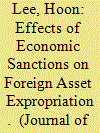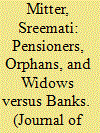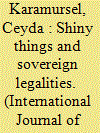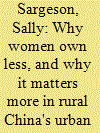|
|
|
Sort Order |
|
|
|
Items / Page
|
|
|
|
|
|
|
| Srl | Item |
| 1 |
ID:
189008


|
|
|
|
|
| Summary/Abstract |
Studies suggest that home countries impose economic sanctions following host state expropriation of home firms. However, and not addressed in the empirical literature, is the possibility that sanctions lead targeted countries to nationalize firms from sender countries. Using bilateral expropriation data from 1985 to 2010, and controlling for endogeneity issues, we find that sanctions significantly increase expropriation risk, encouraging targeted states to inflict pain in a reciprocal manner on sender countries. Expropriations also enable targeted nations to acquire economic assets from foreign firms, undermining the restricting goals of sanctioning states, and provide opportunities for leaders to show political resolve at home by standing up to senders. Our results are robust using monadic or dyadic data and different statistical methods, indicating another sanction-busting strategy used by targeted countries.
|
|
|
|
|
|
|
|
|
|
|
|
|
|
|
|
| 2 |
ID:
180231


|
|
|
|
|
| Summary/Abstract |
This essay attempts to rectify the silence about the willful expropriation, by British and Israeli forces, of private Palestinian financial assets. Placing at its core the stories of ordinary Palestinians, it explores how they were robbed of their bank accounts, bonds, stocks, pensions, salaries, and safety deposit boxes during the creation and termination of the Palestine Mandate (in both 1917 and 1948). The essay argues that the basic financial structure of colonization, which deprives the colonized of the protection of sovereign banking institutions, facilitated these thefts. It also argues that the supposedly neutral rules of finance acted as a fig leaf to such dispossessions. Based on archival research and oral histories, it presents a new social history of finance that centers the experiences and subjectivities of non-elite Palestinians who strove to defend themselves and assert their rights, individually and collectively, during pivotal moments of violent upheaval and rupture.
|
|
|
|
|
|
|
|
|
|
|
|
|
|
|
|
| 3 |
ID:
172333


|
|
|
|
|
| Summary/Abstract |
When do governments impose costs on foreign firms? Many studies of foreign direct investment focus on incentives for government expropriation, but scholars are often forced to rely on indirect measures of expropriation to conduct empirical analyses. This article introduces a data set which includes information on over 5,000 political risk insurance contracts issued by the US Overseas Private Investment Corporation since 1961, and on all the claims filed by investors under these contracts. These detailed insurance data allow us to study the determinants of foreign investors’ losses from a variety of sources, including expropriation, inconvertibility, and violent conflict. To illustrate the benefits of these data for hypothesis testing, we adopt a comprehensive empirical approach and explore both shared and distinct causes across risk categories.
|
|
|
|
|
|
|
|
|
|
|
|
|
|
|
|
| 4 |
ID:
167968


|
|
|
|
|
| Summary/Abstract |
This article probes the legal expropriation of dynastic property in the late Ottoman Empire and early Turkish Republic. Focused on the period from Abdülhamid II's deposal in 1909 to the decade immediately following the abolition of the caliphate in 1924, it takes parliamentary debates as entry points for exploring how this legislative process redefined the sovereign's relationship with property. Although this process was initially limited only to Yıldız Palace, the debates that surrounded it heuristically helped to shape a new understanding of public ownership of property that was put to use in other contexts in the years to come, most notably during and after World War I and the Armenian genocide, before establishing itself as the foundation of a new ownership regime with the republican appropriation and reuse of property two decades later.
|
|
|
|
|
|
|
|
|
|
|
|
|
|
|
|
| 5 |
ID:
116543


|
|
|
|
|
| Publication |
2012.
|
| Summary/Abstract |
As the amount of wealth in China's economy grows, so too does the size of the gender asset gap. Nowhere is this gap more extreme, or its consequences for women's future wealth, subjectivity, and agency more serious, than in peri-urban sites where the conversion of farmland for development has sent property values skyrocketing. This article explores how the gender asset gap is being reproduced in the course of rural China's urban transformation. It queries the plausibility of the most common explanations for this gap, and suggests that Charles Tilly's theory of categorical sources of "durable inequality" offers a useful corrective to those explanations. Drawing on data collected from interviewees and survey respondents in Zhejiang, Fujian, Hunan, and Yunnan provinces between 2004 and 2012 and from secondary sources, the paper illustrates how, when villagers are compensated for the expropriation of their land and demolition of their agricultural and business activities and housing, Village Committees, patrilineal households, and local government authorities utilise gender categories to resolve distributional problems and differentially compensate men. Women become less likely than men to be acknowledged as, and have the capacity to fully act as, the owners, managers, and users of the assets whose value increases as a result of urbanisation.
|
|
|
|
|
|
|
|
|
|
|
|
|
|
|
|
|
|
|
|
|